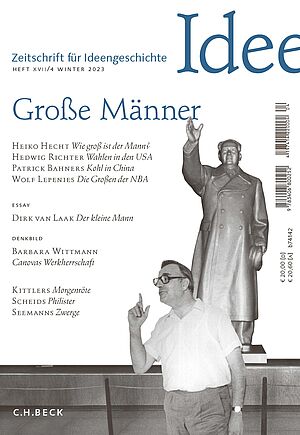
Martin Mulsow, Dr. phil.
Professor of Cultures of Knowledge of the European Modernity
University of Erfurt
Geboren 1959 in Buchholz/Nordheide
Studium der Philosophie, Germanistik und Geschichte in Tübingen, Berlin und München
Project
Islamic Christendom: the History of a Utopia
Das Buchprojekt soll die Annäherung von antitrinitarischem Christentum einerseits und Islam andererseits in all seinen frühneuzeitlichen Facetten und Kontexten beschreiben - von theologischen Brisanzen bis zu politischen Komplikationen. Es geht aus von einem abenteuerlichen Fall solcher Annäherung im London des Jahres 1682 und folgt dann den Spuren der Dokumente zurück in die Vergangenheit. Der Kontext 1682: beginnende kritische Bibelwissenschaft, Unitarismus, Deismus (Stubbe, Toland), frühe Islamwissenschaft. Die Spuren führen ins Jahr 1611, in das Milieu der Moriscos in Spanien und Marokko. Der Kontext hier: Fälschungen (Bleibücher, Barnabasevangelium, antichristliche Texte von vertriebenen Moriscos, diplomatische Beziehungen nach Holland). Weiter zurück führt die Spur (über den möglichen Autor des Barnabasevangeliums) ins Istanbul der Jahre 1570-1600. Der Kontext hier: Moriscos, "trinitarische" Sufis, antitrinitarische Exulanten (Adam Neuser). Adam Neusers Geschichte wird mit neu gefundenen Dokumenten aufgerollt. Von dort aus geht es zurück zum frühen Antitrinitarismus (Michel Servet) und seinen Islamkontakten (um 1540), ins arabische Mittelalter, bis hin zur Pauluspolemik im Islam und bei Judenchristen.Lektüreempfehlung
Mulsow, Martin. Die unanständige Gelehrtenrepublik: Wissen, Libertinage und Kommunikation in der Frühen Neuzeit. Stuttgart: Metzler, 2007.
- Moderne aus dem Untergrund: Radikale Frühaufklärung in Deutschland 1680-1720. Hamburg: Meiner, 2002.
- "Socinianism, Islam and the Radical Uses of Arabic Scholarship." Al-Quantara. Revista de estudios árabes 31 (2010): 549-586.
Colloquium, 22.01.2013
Islamic Christianity: History of an Entanglement
Have Christians and Moslems always been enemies? Or were there rapprochements, alliances, and perhaps even a kind of fraternization as the result of misunderstandings or for tactical reasons? And if such was the case, then how did the rest of the culture react? What does one do when loopholes emerge in the "clash of civilizations"? The book on which I am working focuses on these episodes of fraternization in which strange hybrid mixtures of Islam and Christianity developed and to which Henry Stubbe, circa 1670, gave the very positive and even utopian label of "Mahommetan Christianity." The subtitle of my book is "The History of an Entanglement," for we are in fact dealing here with an actual entanglement in the crudest and most direct sense of the term and to a degree that has seldom been witnessed between religions. It is worthwhile investigating the reasons for such, what kind of scandals these episodes might have prompted, and above all the motives and beliefs that informed these cases.
With my book I am attempting to tell this tale in reverse, like a detective story, starting with a spectacular incident from the year 1682 and then shedding light on the case by drifting backward in time and examining its antecedents. This automatically leads us to Dutch diplomats and Spanish Moriscos (forcibly Christianized Spanish Moslems) who were expelled from the Iberian peninsula around 1610; and from here to Istanbul in the year 1570, when Adam Neuser lived there, a German theologian who had converted to Islam; and then yet further back into the medieval Arabic world, a period that saw a slew of Islamic polemics directed against Christianity. My history is one of religious adventurers, border crossers, migrants and not least double agents.
I’m still not sure whether there’s a moral to this story. In any event, this "entangled history" shows how violence and tolerance, slick forgeries and conscious rapprochements are constantly alternating with one another. Forgeries were linked to ideals of the one true religion, just as the later ideals of the Deists and Radical Enlightenment philosophers concerning an "Islamic Christianity" fell credulous prey to the forgeries. The origins of the Enlightenment are entangled with the delusions of the Enlightenment thinkers.
Publications from the Fellow Library
Mulsow, Martin (Göttingen, 2025)
Naturrecht und Emotion : eine Geschichte der Gefühle im 18. Jahrhundert Historische Geisteswissenschaften ; Band 17
Mulsow, Martin (Berlin, 2022)
Überreichweiten : Perspektiven einer globalen Ideengeschichte
Mulsow, Martin (Wiesbaden, 2014)
Philalethes in Deutschland : alchemische Experimente am Gothaer Hof 1679-1683
Mulsow, Martin (Berlin, 2014)
Radikalaufklärung Suhrkamp-Taschenbuch Wissenschaft ; 2053
Mulsow, Martin (Stuttgart, 2014)
Texte zur Theorie der Ideengeschichte Reclams Universal-Bibliothek ; 19144
Mulsow, Martin (Göttingen, 2014)
Mulsow, Martin (2014)
Fluchträume und Konversionsräume zwischen Heidelberg und Istanbul : der Fall Adam Neuser
Mulsow, Martin (2014)
"Vom Verfasser des Hierokles" : Christian Ludwig Paalzow als Autor von Vollmers Verlag
Mulsow, Martin (2014)
Ausweitung der Kampfzone : die Globalisierung der Aufklärung und ihre Grenzen
Mulsow, Martin (Köln, 2014)
Kriminelle - Freidenker - Alchemisten : Räume des Untergrunds in der Frühen Neuzeit








